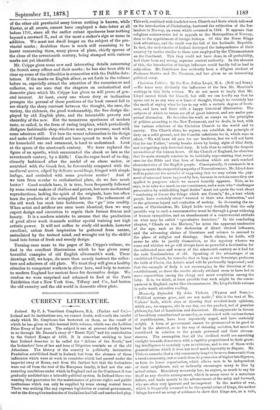CURRENT LITERATURE.
Iceland. By C. A. Vansittart Conybeare, B.A. (Parker and Co.)— Iceland and its institutions are, we cannot doubt, well worth the careful study which Mr. Conybeare has bestowed on them, as the result of which he has given us this learned little volume, which was the Lothian Prize Essay of last year. The subject is one at present chiefly known to us through Mr. Dasent's story of "Burnt Njal," and his contribution to the Oxford Essays of 1858. It is somewhat striking to hear that Iceland deserves to be called the " Athens of the North," and the Icelanders' love of law and love of litigation reminds us of the old Athenians. The history of the country is politically instructive. Feudalism established itself in Iceland, but from the absence of those influences which were at work in countries which bad passed under the imperial sway of Rome, and from the further fact that the Icelanders were cut off from the rest of the European family, it had not the sur- rounding conditions under which in England and on the Continent it was gradually modified into a tolerable political system. In Iceland there was wanting that guarantee for the maintenance of private rights and public institutions which can only be supplied by some strong central force. There was nothing like any supreme legislation or central government, and so the disruptive tendencies of feudalism had full and unchecked play. This evil, combined with feuds bet xeen Church and State which followed on the introduction of Christianity, hastened the subjection of the Ice- landers to Norway, an event which occurred in 1264. It appears that religious controversies led to appeals to the Metropolitan of Norway, then to the appointment of foreign bishops. Of this the Norse Kings took advantage, and the result was the fall of the Icelandic Republic. In fact, the ecclesiastics of Iceland destroyed the independence of their country by tactics similar to those now employed by the Ultramontanes on the Continent. This they could not have done, in all probability, had there been any strong, supreme control authority. In the absence of this, the introduction of foreign influence could hardly fail to lead to subjection. Mr. Conybeare has evidently boon a diligent student of Professor Stubbs and Mr. Freeman, and has given us an interesting political essay.






























 Previous page
Previous page